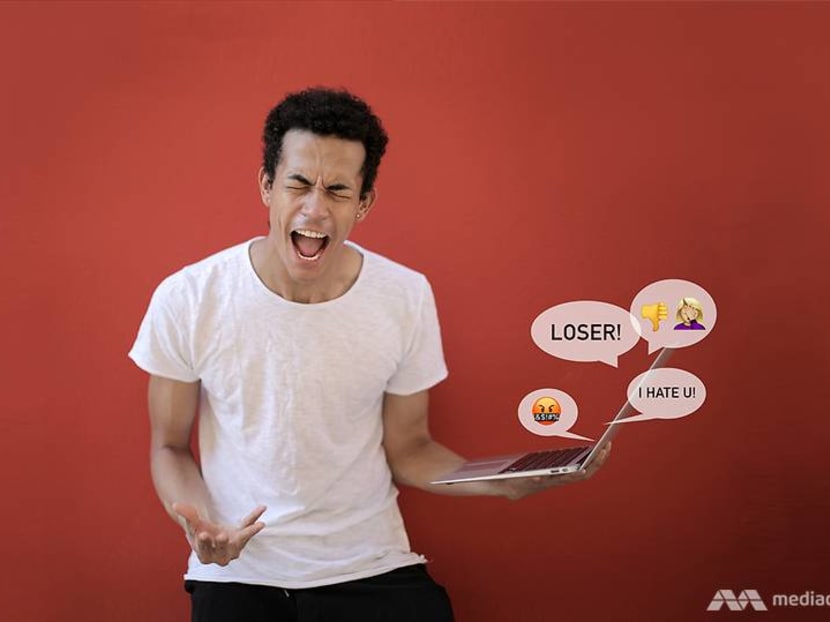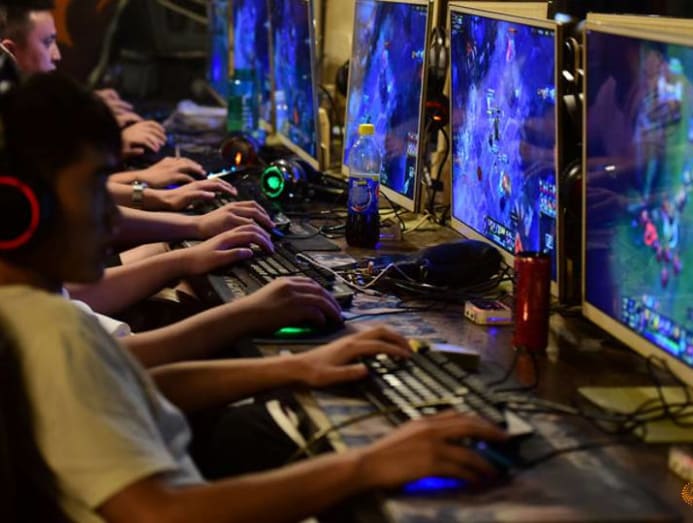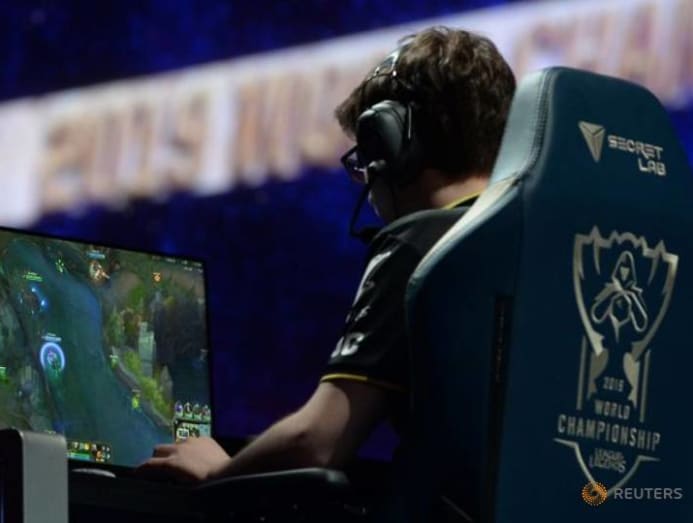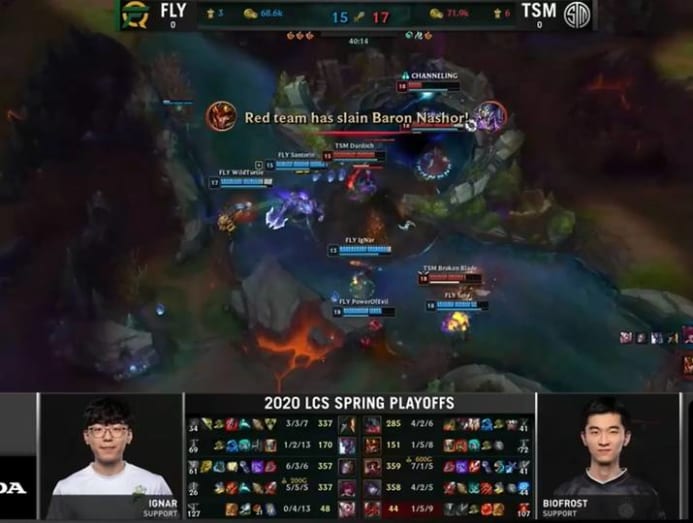Flaming, sexism, trolls: The toxic side of online gaming and how to deal with it
If you thought social media trolling was bad, wait till you dive into competitive online gaming. How bad does it get and how does one deal with it?

(Art: Jasper Loh, Pexels)
When the COVID-19 situation became worse and "circuit breaker" measures went into effect, many of us would have turned to video games – online or otherwise – to while away the time at home.
A 2020 report from Limelight Networks on the state of online gaming even showed that Singaporeans seem to spend an almost inordinate amount of time playing, with an average of 5.85 hours per week spent on gaming (and actually topped the list for those who skipped sleep in order to do so, with 60 per cent of respondents).
READ: Game (still) on: Why e-sports is surviving in the age of quarantine
But imagine this scenario: After work is done for the day, you hop into a game or two. You’re looking forward to some “me time”, having fun and overall just being entertained.
And then the flaming begins.
You’re into your first game of the day, your team is down three kills to 20, and you’re trying to salvage a win on League Of Legends – and before you know it, you’re witnessing a barrage of verbal insults as your virtual teammates (total strangers in real life) start to berate each other.

“Kill yourself useless mid laner,” one types. Another one launches into a tirade of racist insults and then promptly leaves the game, leaving the rest in a four versus five situation in which winning is now impossible.
In an activity where people are supposed to have fun and work together, many games have become places where toxic behaviour rears its ugly head, and what is supposed to be an enjoyable experience becomes filled with aggression instead.
So what’s it like to be a gamer on the receiving end of such toxicity? What causes such destructive flaming behaviour? And how can one deal with it?
‘I BREAK OUT INTO COLD SWEAT’
For many who play online games, a toxic environment may be something that they have become accustomed to and learnt to ignore – even if the behaviour still seems baffling to some.
Jeremy, a 23-year-old financial adviser, shared that when someone flames him in-game, he would naturally feel confused.
“We are playing a team game and need to work together to win,” he said. “I normally don’t respond to unnecessary flaming or toxicity. If I feel that it is too much and I’m getting tilted, I will mute them to focus on the game.”
I usually keep quiet and not respond because I’m wary that they will throw the game if I respond.
“Tilt” originates from a poker term, which basically means you’re getting angry or frustrated.
His reaction to getting flamed isn’t unusual either. Just like with advice given to people getting bullied, sometimes the best thing you can do is to ignore them.
“I usually keep quiet and not respond because I’m wary that they will throw the game if I respond,” said Jade, a 22-year-old student.
READ: Watched enough TV? Try these video games for every mood while staying home
Like Jeremy, she also said that experiencing toxicity can lead to a bad performance. “When someone flames me in-game, I always break out into cold sweat first, then my performance starts to become worse at that match because I’m nervous,” she added.
Sometimes, the flaming gets extremely out of hand. Jeremy said that he’s had games where other players told him to kill himself or that they “hope your family dies because you suck”.

‘SHE’S A GIRL, OF COURSE LOSE’
And for female gamers like Jade, the problem extends beyond just online insults towards them as players. Getting targeted simply for being a woman is also an issue.
“Guys usually like to include sexual things whenever they find out that there’s a girl on their team. That’s why I just keep quiet or just pretend I’m a young teen playing the game,” said Jade.
They called me trash and retard, and that it was because I’m a girl that’s why we lost.
She recalled one incident where her team lost a game and she got blamed by two other male players on her own team.
“They called me trash and retard, and that it was because I’m a girl that’s why we lost. I quote them: ‘She’s a girl mah of course lose lah. Confirm use the boyfriend account play one haha boyfriend carry nia'. I still remember their in-game names,” she said.

In another incident, some players on her team purposely played badly in order to lose the game as they did not want to play with a girl on their team.
She said: “There’s a special bunch of them who think females can’t play games and should just stay in the kitchen.”
Defending yourself might also not be the best course of action, as it could sometimes make matters worse.
“Trying to justify or defend myself usually wouldn't turn out well as it adds fuel to the fire. Then both parties would just be flaming each other or they might decide to throw the entire game,” said Brenda, a 22-year-old student.
Trying to justify or defend myself usually wouldn't turn out well as it adds fuel to the fire.
On the other hand, one player, who wished to remain anonymous, said that they would sometimes argue back because they felt a need to defend themselves.
“I felt that I should defend or stand up for myself, as there’s no reason to flame someone like this. And maybe it’s also to vent some of the anger,” this person said.
VIOLENT GAMES, AGGRESSION, LACK OF EMPATHY
What causes some gamers to blow their top and be awfully mean? According to Tham Yuen Han, executive director and clinical director of WE CARE Community Services, one of the possible factors is the type of games being played – specifically those with a competitive aspect and violent content.
According to her, research into the area of violent video games has shown that there is an increase in aggressive behaviour among gamers who play such games, which leads to aggressive thinking or a greater lack of empathy.

Some of those who’ve been exposed to such games for a long time might also adopt the view that the violence is normal and may endorse real-life violence.
Anonymity is a huge factor in this inhibition, as it gives people the bravado to be more aggressive than they would in real life.
Another big factor at play could be the fact that people who flame are already addicted to the game they play, which can manifest in unhealthy behaviour.
READ: How a Singaporean spent 3 years to create a horror video game all by himself
“If someone is beginning to show signs of aggression, it’s difficult to exercise the self-control to pull out. What we do know for a fact is, regardless of game content, if someone is addicted, the attitude and behaviour of aggression and hostility may be present already,” said Tham.
She also brought up the fact that the anonymity that comes with online gaming is another reason why people flame others in-game.
“Anonymity is a huge factor in this inhibition, as it gives people the bravado to be more aggressive than they would in real life,” she said. “They are less given to consider social norms and politeness.” In “extreme cases”, this behaviour may even carry over into real life, she warned.
And for victims, the toxic environment can sometimes result in a vicious cycle as well. Tham said that people who experience flaming may ruminate on it, which can even turn them aggressive.
HOW TO DEAL WITH MEAN GAMERS
When faced with flamers or toxic behaviour, it’s best to ignore it and stop playing the game if it is starting to affect you, said Tham.

“The likelihood that someone is feeling distress is already a sign of concern. If you feel distress and continue to engage, that’s a sign of concern.”
And while the gamers whom CNA Lifestyle talked to are adults, it’s a world with a lot of younger people – who might even be the ones doing the flaming.
READ: Is your child a bully? How parents can spot the signs and what they should do
For parents who discover hints of aggression in their child, one of the first things to do is to make sure that they’ve enough information about online content to ensure that gaming world is a safe environment, Tham said. Parents should also know how to curate the types of games their child engages in.
Sometimes the child has problems at school but online he’s doing well and he feels like a winner.
It also helps to take a softer approach when talking to them. “When people engage in a certain amount of activity, they obviously see certain benefits that they get out of it. One of the first things is not to say that it’s wrong. The moment you say: ‘It’s wrong don’t do this.’ You close them out of discussion. Try to understand what they do and what they get out of it,” she said.
“Sometimes the child has problems at school but online he’s doing well and he feels like a winner. Start from the position of not judging and understanding what the draw is for your child,” she added.
“What is so fun about it? Sometimes it could be that the child has a real sense of achievement and feel they may be really good at it even if they’re not sporty or athletic in real life. The other thing is, once you understand, you know what the options are. Rather than ‘don’t do this’, you can introduce them to more alternatives. It becomes a problem when it's excessive and the only form of entertainment and escape.”





